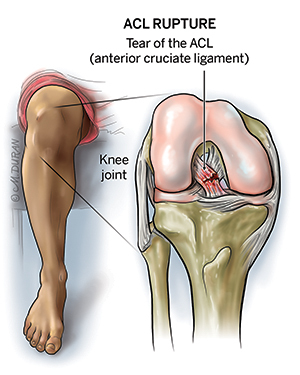About Anterior Cruciate Ligament (ACL) Injuries
The anterior cruciate ligament (ACL) in the knee connects the bones of the thigh and shin. Injuries involving the ACL, which often result from sudden stops or changes in direction while moving, are among the most common sports injuries that affect the knee.

When you injure your anterior cruciate ligament, you might hear a “popping” noise and you may feel your knee give out from under you. Within 24 hours, your knee will swell. If ignored, the swelling and pain may resolve on its own. However, if you attempt to return to sports, your knee will probably be unstable and you risk causing further damage to the cushioning cartilage (meniscus) of your knee. Depending on the severity of your injury and your activity level, you may require surgery to regain full function of your knee
Symptoms of ACL Injuries
ACL injury symptoms may vary in severity depending on the extent of ligament damage.
Symptoms of ACL Injuries may include:
- Discomfort while walking
- Loss of full range of motion
- Pain with swelling
- Tenderness along the joint line
Risk Factors for ACL Injuries
While ACL injuries are more common in sports that are hard on the knees such as football or skiing, certain people are at higher risk.
Risk factors for ACL injuries may include:
- Health history: People who have previously injured their ACL are at higher risk for re-injury.
- Safety factors: Improper equipment and poor conditioning can lead to ACL injury.
- Sex: Female athletes are more likely to sustain an ACL injury.
Treating ACL Injuries at UT Health Austin
Upon evaluation of your knee, possibly including imaging, your medical provider will discuss whether surgical or nonsurgical treatment is the best route depending on your goals and activity level. Surgical treatment involves rebuilding the ligament arthroscopically using minimally invasive incisions to restore knee stability, range of motion and function. Post-surgery most patients experience a reduction in pain and improvement in function with rehabilitation. Your care team will walk you through the risks and benefits as well as what to expect for the procedure and recovery process.
Care Team Approach
At UT Health Austin, we take a multidisciplinary approach to your care. This means you will benefit from the expertise of multiple specialists across a variety of disciplines caring for you in one place to avoid having to schedule multiple appointments with providers at locations all over the city. The Sports and Injury Clinic care team includes orthopedic surgeons, sports medicine physicians, physiatrists, physical therapists, chiropractors, nurse practitioners, dietitians, social workers, and more, who work together to help you get back to the things in your life that matter most to you.
We also collaborate with our colleagues at The University of Texas at Austin and the Dell Medical School to utilize the latest research, diagnostic, and treatment techniques, allowing us to provide you with comprehensive, whole-person orthopedic care to help you meet your goals. Treatment may include non-surgical interventions, such as lifestyle modifications, physical therapy, or medication and injections, or surgery may be the best course of action to help improve your pain and function. Advanced imaging and lab testing are also available on-site if needed.
Learn More About Your Care Team

Musculoskeletal Institute
Health Transformation Building, 9th Floor
1601 Trinity Street, Bldg. A, Austin, Texas 78712
1-833-UT-CARES (1-833-882-2737)
Get Directions

Sports and Injury Clinic
Health Transformation Building, 9th Floor
1601 Trinity Street, Bldg. A, Austin, Texas 78712
1-833-UT-CARES (1-833-882-2737)
Get Directions